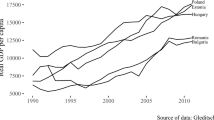Abstract
30 years since the regime change: beyond an occasion and a topic of academic and political discussions, this period also constitutes the lifetime of a generation. Connecting socio-economic analysis with their own position as members of this generation, the authors provide an account of postsocialist transformation in Romania. Against interpretations that conceive communism as a system separate from the capitalist world economy, and understand transition as a story of “returning to capitalism”, the chapter depicts the specific ways in which communist Romania’s internal development was tied to changing geopolitical and world-economic partnerships. Within this process, authors trace their own generational experience as marked by three overlap** crises of structural processes: the profitability crisis of the post-1945 global cycle that starts in the 1970s, the crisis of the communist model of rapid industrialization; and the social crisis built up by global neoliberalization, into which postsocialist societies entered with the highest hopes of freedom and capitalist welfare.
Access this chapter
Tax calculation will be finalised at checkout
Purchases are for personal use only
Similar content being viewed by others
Notes
- 1.
See the key text for this orientation, Howe, N.,Strauss, W. 2000. Millennials rising. The great next generation. New York: Vintage Books.
- 2.
A term coined by Raymond Williams (1977).
- 3.
The “last soviet generation” is a term introduced by Alexei Yurchak to describe the experiences of Soviet citizens born between the 1950s and early 1970s. Hence, both in terms of temporality and conception our understanding is different. We refer to the last Communist generation in order to speak about people roughly born in the last decade of Romanian Communism, during its terminal decline. See Yurchak (2006).
- 4.
Keir Milburn similarly, and quite tellingly, overlooks this aspect in his investigation of the rise of a new generation of left-wing movements and activists. He sees this trend only pertaining to the West (US, UK and Spain) whereas eastern Europe is, mistakenly, reduced to cohort of youngsters who vote for the extreme right. See Milburn (2019).
- 5.
A similar effort was employed by Andrew Janos, though we diverge from his perspective since we are indebted to a historical materialist understanding. See Janos (2000).
- 6.
There is a vast literature here, but see the classic Arendt (1973).
- 7.
Examples abound here, but see Mandel and Humphrey (2002).
References
Arendt, H. (1973). The origins of totalitarianism. Harcourt Brace Jovanovich.
Arrighi, G. (2007). Adam Smith in Bei**g. Lineages of the 21st century. Verso.
Arrighi, G. (2010). The long twentieth century: Money, power, and the origins of our times. Verso.
Ban, C. (2012). Sovereign debt, austerity, and regime change: The case of Nicolae Ceausescu’s Romania, East European. Politics and Society, 26(4), 743–776.
Brenner, R. (2006). The economics of global turbulence. The Advanced capitalist economies from long boom to long downturn. Verso.
Brucan, S. (1990). Pluralism and social conflict: A social analysis of the communist World. Praeger.
Carchedi, G., & Roberts, M. (Eds.). (2018). World in crisis. A global analysis of Marx’s Law of Profitability. Haymarket Books.
Chase-Dunn, C. K. (1982). Socialist States in the World-System. Sage.
Derluguian, G. M. (2005). Bourdieu’s secret admirer in the Caucasus: A World-System Biography. University of Chicago Press.
Dunn, E. (2004). Privatizing Poland: Baby Food, Big Business, and the Remaking of Labor. Cornell.
Friedman, K., & Friedman, J. (2008). Modernities, class, and the contradictions of globalization: The anthropology of Global systems. AltaMira Press.
Harvey, D. (2005). A Brief History of Neoliberalism. Oxford University Press.
Hopkins, T, & Wallerstein I. (1996). The age of transition: Trajectory of the World-System 1945–2025. Zed Books.
Janos, C. A. (2000). East Central Europe in the Modern World: The politics of the Borderlands from pre- to postcommunism. Stanford University Press.
Kalb, D. (2005). From flows to violence: Politics and knowledge in the debates on globalization and empire. Anthropological Theory, 5(2), 176–204.
Krastev, I., & S. Holmes. (2019). The light that failed. Why the West is losing the fight for democracy. Pegasus Books. Epub format.
Lazarus, S. (2007). Lenin and the Party, 1902 – November 1917 in Lenin Reloaded: Toward a politics of truth. Duke University Press.
Mandel, R., & Humphrey. C. (2002.) Markets and moralities: Ethnographies of postsocialism. Berg.
Mannheim, K. (1952). Essays on the sociology of knowledge. Oxford University Press.
Milburn, K. (2019). Generation left. Polity Press. We return to this issue below.
Mills, W. C. (1959). The sociological imagination. Oxford University Press.
Streeck, W. (2014). Buying time. The delayed crisis of democratic capitalism. Verso.
Williams, R. (1977). Marxism and literature. Oxford University Press.
Yurchak, A. (2006). Everything was forever until it was no more. The last soviet generation. Princeton University Press.
Author information
Authors and Affiliations
Corresponding author
Editor information
Editors and Affiliations
Rights and permissions
Copyright information
© 2022 The Author(s), under exclusive license to Springer Nature Switzerland AG
About this chapter
Cite this chapter
Domşodi, D., Poenaru, F. (2022). Life in Transition and in Crisis. The Political Autobiography of a Generation. In: Gagyi, A., Slačálek, O. (eds) The Political Economy of Eastern Europe 30 years into the ‘Transition’. International Political Economy Series. Palgrave Macmillan, Cham. https://doi.org/10.1007/978-3-030-78915-2_2
Download citation
DOI: https://doi.org/10.1007/978-3-030-78915-2_2
Published:
Publisher Name: Palgrave Macmillan, Cham
Print ISBN: 978-3-030-78914-5
Online ISBN: 978-3-030-78915-2
eBook Packages: Political Science and International StudiesPolitical Science and International Studies (R0)




